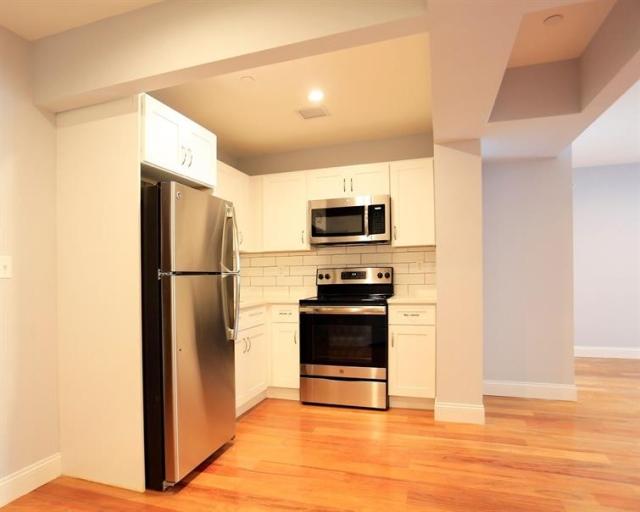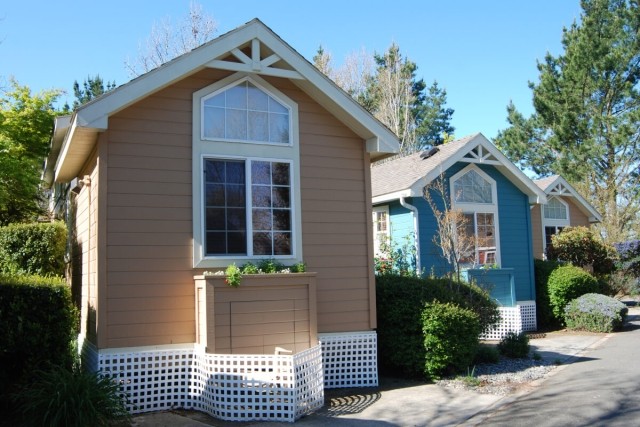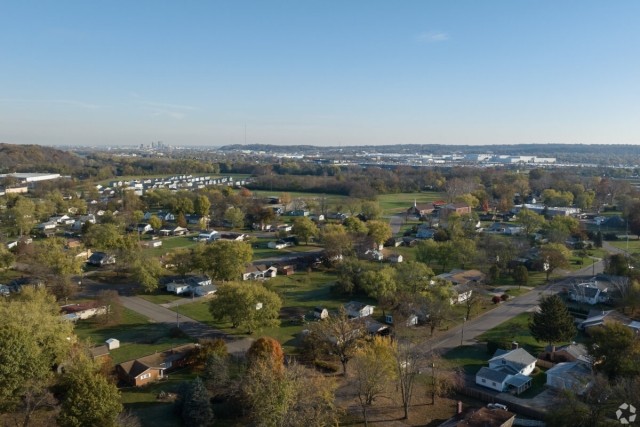It's an exciting journey, renting your first place – and one you shouldn't make in the dark! So let's shine a light on leasing. Here’s a step-by-step guide to renting an apartment for the first time.
Step 1: Look at Apartments That Fit Your Budget.
Key Takeaway: Only look at apartments you can afford. Falling in love with a place above your budget sets you up for disappointment or financial strain.
Renting your own place sounds easy, right? Just start searching on Apartments.com, take a tour or two, and move in. But suppose after you move in, you discover you’re in over your head. After eating ramen for every meal and keeping the lights off, you realize you can’t afford your new place!
What went wrong? You had a budget. Okay, you went slightly above, but those floor-to-ceiling windows … you fell in love at first sight and decided you’d make it work somehow.
You’ve committed the fatal mistake of looking at apartments out of your budget … every place after “the dream apartment” will pale in comparison. Save future you from a year of ramen! Before you start looking, make a budget and stick to it. Here’s the golden rule: If you can’t afford the rent, don’t look at the apartment.
How to Calculate Your Rent Budget:
-
Start with your net monthly income (your paycheck after taxes).
-
Subtract fixed expenses (loans, credit cards, subscriptions).
-
Add 10-15% for unexpected expenses (car repairs, doctor visits).
-
Estimate essential costs:
-
Utilities: $250–$350/month (5-10% of income)
-
Groceries: $300–450/month
-
-
Subtract money needed for lifestyle costs (entertainment, dining out).
-
The amount left is your maximum rent.
Golden Rule: If you can't afford the rent, don't tour the apartment.
Step 2: Know Your Credit Score.
Why It Matters: Landlords use your credit score to evaluate risk. A low or no credit score can mean higher deposits or rejection.
Do you know what your credit score is? If you don’t, find out – you can do this for free through annualcreditreport.com. If you have bad credit or no credit, the property manager could refuse you -- or they could increase the security deposit based on your credit score. If this is the case, you might want to consider a cosigner.
What’s a cosigner?
A cosigner is someone who signs your lease along with you, guaranteeing that if you don’t pay your rent, they will take responsibility. They don’t live in your apartment, they just assume your debt. Being a cosigner for someone is a major commitment, so make sure you have all of your facts and figures (your detailed budget from above, for example) when you approach someone and ask them to do this. Typically, a family member or a close friend will act as a cosigner.
Step 3: Should You Get a Roommate?
If, after crunching the numbers and analyzing your credit, you determine that you won’t be able to do this alone, you might want to consider getting a roommate. On the one hand, having someone to split the costs can lessen the burden of renting and make life just a little bit easier financially. But living with another person can present an entirely new set of challenges, especially if you don’t particularly like their quirks and habits.
If you do decide to get a roommate, the landlord may want you both to be listed on the lease – and they will likely check both of your credit histories. Also, know this: the landlord might increase the rent due to the roommate's additional "wear and tear" on the apartment. They can also increase your security deposit, so be sure to ask about the apartment community's roommate policy so there aren't any surprises.
If you decide a roommate is the right move, it’s time to set up roommate interviews! Here are some questions to ask potential roommates:
- Are you a smoker?
- Do you have pets? Do you want a pet?
- Do you have any allergies?
- What is your daily schedule?
- Are you a morning person or a night person?
- Do you consider yourself neat or messy?
- How important is it to you to pay your bills on time?
- Have you ever been late on rent?
- Do you enjoy cooking at home or dining out?
- What do you like to do on weekends?
- What’s your policy on overnight guests?
- Are you an introvert or an extrovert?
- What are your pet peeves?
- What do you consider the most important trait in a roommate?
- Do you mind sharing things or do you prefer to keep everything separate?
Once you’ve decided on a roommate, you might want to create a roommate agreement. This simple agreement will keep you both on the same page, keep disagreements to a minimum, and clearly outline your responsibilities.
Step 4: What to Know Before You Choose an Apartment: Needs vs. Nice-to-Haves
As a first-time renter, you probably have a lot of questions. Here are a few answers as you head out to look at apartments:
-
What amenities do I need, and do they cost extra?
Don’t be blinded by a great rooftop deck or a spectacular clubhouse – those types of amenities often come with fees attached. Make sure you ask how much it costs to rent out the clubhouse or the deck for parties and events. You can avoid the fees by never using these amenities, but then those "extras" shouldn't factor into your decision-making.
Don’t be dazzled by the bells and whistles. That great loft with soaring, floor-to-ceiling windows could cause your heating and cooling costs to soar, too. Sure, those windows look amazing. But during the winter and summer, all of those windows could make it more difficult to regulate the temperature, leading to higher utility bills.
Granite countertops and a fireplace? Luxury features are nice to have. But they often come at a higher cost. If you rarely use your kitchen and are never home long enough to light a fire, why spend the extra money on these features?
Found a rental with a yard? Backyard BBQs might be calling, but before you sign the lease, ask the landlord about yard responsibilities. Will they handle the maintenance? If so, is there an extra fee? If it’s up to you, factor in the costs of a lawn mower, watering, and upkeep.
-
Where should I look?
Location is crucial. While you might be tempted to choose that cozy apartment in the suburbs because of the lower rent, you might end up paying much more in time and fuel expenses if you have a long commute to school or work. And if you are interested in having restaurants, movie theaters, museums, and other attractions nearby, keep that in mind as you search.
-
What if I want a pet?
Even if you don’t currently have a pet but think you might want one in the near future, you’ll want to make sure your potential rental is pet-friendly. Make sure you ask the leasing agent about pet fees, extra deposits, and pet rent.
-
How do I do laundry?
In an apartment community, you’ll likely have either an on-site laundry facility or washer/dryer connections. If there are connections in your apartment, you can purchase your own washer and dryer and take them with you when you move out.
-
How do I get Wi-Fi?
Many apartment communities don’t offer free Wi-Fi, but you can get this through your Internet provider. Ask the leasing agent if there's a preferred provider – they often offer a discount to encourage residents to use their preferred provider. If not, search for the service providers in your city and contact them directly.
-
How do I pay rent, and what happens if I don’t pay on time?
Rent is typically due on the same day each month. Ask if the community offers online rent payment options—many do through a resident portal. If not, you may need to visit the leasing office each month to pay by credit card, debit card, electronic transfer (ACH), or check.
If you can’t pay on time, be proactive. Talk to your landlord and ask about partial payments or a temporary arrangement. Always get any agreement in writing. But be cautious—your landlord can issue a "notice to end tenancy early" (eviction notice) even if you're one day late. If you pay within 14 days, the notice is voided. Repeated late payments, however, can lead to lease termination at the end of your term.
Step 5: Head to the Leasing Office! You’re Ready.
Now that you’ve found a place within your budget that has the amenities you need, it’s time to sit down with the leasing agent. You’ll want to bring some things along with you, such as a payment stub, reference letters, and your checkbook.
Did you know that a typical security deposit could be up to two months' rent? In addition, many apartment communities charge rent for the first and last month – in advance. Make sure you've saved up three times your monthly rent, plus moving expenses, before you sit down with the leasing agent.
Questions to Ask Before Signing Your Lease
You can negotiate your lease! Be prepared – research similar rentals in the neighborhood to see what the price difference is. If your timing is flexible, try to rent near the end of the month – landlords are more likely to make a deal then. You might also have more negotiating power if you move during the winter, when fewer people are looking for apartments, as opposed to the summer.
If you plan on staying in your apartment long-term, ask the property manager if you could sign a longer lease for lesser rent. If the landlord won’t negotiate on rent, you could ask for other things – a freshly painted apartment, new flooring, or a better parking spot.
Read your lease. It’s long, it’s boring, it’s filled with rental legalese, but take the time to actually read it. Make sure you understand it, and don’t be afraid to ask questions about the lease – especially any items you don’t understand or want more information about.
Once you sign on the dotted line, you’ll get the keys to your new place! And since you know exactly what the terms of your lease agreement are and you’ve created a budget that works, you’ll live happily ever after – or, at least, until it’s time to renew the lease.
This article was originally published on January 18, 2019, and has since been updated.
FAQs
Is it hard to rent your first apartment?
Renting your first apartment can be challenging if you lack rental history or credit. However, many landlords are open to first-time renters. You may need a co-signer, proof of income, or a larger security deposit to secure the lease.
How much money should I save to rent my first apartment?
Plan to have at least three times your monthly rent saved. Typically, you’ll need one or two months’ rent for the deposit, plus first (and sometimes last) month’s rent upfront, along with moving costs and an emergency fund.
Is it hard to get approved for your first apartment?
Getting approved can be tricky without a rental history, but you can improve your chances by:
- Providing personal references.
- Showing proof of income.
- Offering a larger security deposit.
- Paying rent in advance.
- Finding a roommate with good rental history or a co-signer.
What documents should I bring to the leasing office?
Be prepared with:
- Recent pay stubs or proof of income
- Photo ID (driver’s license/passport)
- Reference letters (from employers or prior landlords)
- A checkbook or payment method, and be ready for a credit/background check
What are common mistakes first-time renters make?
Some common mistakes include:
Not reading the lease thoroughly.
Overlooking additional costs like utilities and parking.
Ignoring the neighborhood’s safety or location.
Failing to document the apartment’s condition before moving in.
How do I know if the apartment is in a safe neighborhood?
Visit at different times of the day, look for sidewalks and outdoor lighting, note traffic patterns, research safety and crime data, and check noise levels.
Is renters insurance necessary for first-time renters?
While not required by law, renters insurance is often required by property managers and landlords. Renters insurance covers your personal belongings, liability, and temporary housing in case of emergencies, so even if it isn’t required by your landlord, it’s recommended to have.






